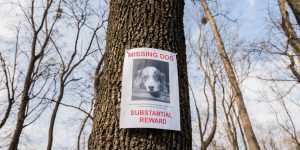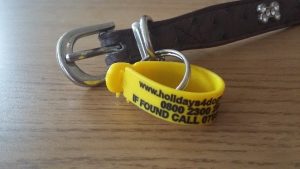It is one of the most frightening things when you lose a dog – even if he, or she, only disappears out of sight for a short while. But, what can you do if your dog is lost, goes missing for any length of time? Holidays4Dogs offers some advice on the best course of action.
How do dogs become lost?
Fireworks, or other loud noises, can frighten some dogs. If they are fearful dogs already, they can often tend to bolt over a long distance in a relatively short space of time. Once separated completely from their owner they become more frightened, which makes it difficult for anyone to catch them.
often tend to bolt over a long distance in a relatively short space of time. Once separated completely from their owner they become more frightened, which makes it difficult for anyone to catch them.
In this way, a dog can travel a fair distance through fear. The more people that scare him by trying to catch him, the more this can push him further out of his local area.
Lack of training may also be a factor. If a dog hasn’t received enough training, he is far more likely to become lost and harder to catch.
Other dogs may have escaped by opportunity of an open gate, or door. These dogs may have a strong wanderlust and follow their noses with great interest, over significant distances.
What to do if your dog goes missing.
As soon as you discover your dog is missing, immediately call your local dog warden and any local rescue centres to report your dog missing. You can also register your lost pet with Doglost.uk.
It is essential to contact your microchip provider as soon as possible, to notify them your dog is lost. Also contact veterinary surgeries in the locality. Stay as positive as you can and try not to panic. Many dogs are found quickly and are missing for only a short time.
Make local dog walkers aware that you dog has gone missing.
Walk around the area you last saw your dog, enlisting the help of friends and neighbours, if possible. Alert other dog walkers who may be in the vicinity. Tell them your dog is missing and provide a description. Keep calling your dog, stopping frequently, and listening for any sight, or sounds.
The power of social media when your dog is lost.
Social media has proven to be a powerful tool in recovering lost dogs, so do this as soon as you can. Post on local social media pages, providing a detailed description and photograph. Flyers are also a good idea, so if you are able, place as many as you can in the area.
Leave an item of your clothing where you last saw your dog.
If you don’t have any luck initially, don’t give up.  Keep returning to the spot where you last saw your dog and keep calling.
Keep returning to the spot where you last saw your dog and keep calling.
If your dog is still missing by the end of the day, leave an item of your clothing, some food and a bowl of water, near to the place he was last seen.
Place this somewhere sheltered if possible, rather than out in the open where you dog is less likely to go.
If there are any sightings of your dog, go there as quickly as you can. Arm yourself with tasty treats and call your dog. If your dog seems frightened, don’t immediately rush towards him.
Call him in a light hearted tone and try to get him to follow you, using treats if necessary. Never chase a lost dog that appears frightened and try to make sure other people are aware of this.
Check the terrain nearby.
It is quite common for some dogs, especially small dogs like terriers to become trapped in rabbit holes. In my local area recently, someone did indeed lose their terrier while out walking. A walker discovered the dog sometime later trapped in a hole. After seeing his details on social media, the walker made a conscious effort to look out for the lost dog.
If your dog goes missing, microchips, I.D. and trackers can be invaluable in finding lost dogs.
A lost dog is every dog lover’s nightmare, but there are steps you can take to minimize this happening. Make sure your dog’s microchip details are up to date, (this is now law in the UK). Your dog should also wear an I.D. tag as well.
Ensure fences are secure so that your dog cannot escape. If your dog is the sort to bolt out of open doors and gateways, consider some extra training with help from an expert. If this is not possible, consider using baby gates, so your dog cannot access exit open doorways.
When your dog is staying with a Holidays4Dogs carer he will wear additional ID with our own unique numbers on. Carers will never leave guest dogs un-supervised in gardens, or have access to open exit doors; i.e. the carer will make sure your dog is secure before opening the front door. Our Holidays4Dogs carers will only walk dogs off-lead with the owner’s express written permission.
Carers will never leave guest dogs un-supervised in gardens, or have access to open exit doors; i.e. the carer will make sure your dog is secure before opening the front door. Our Holidays4Dogs carers will only walk dogs off-lead with the owner’s express written permission.
If your dog has a poor recall, or is nervous, keep him on a long line, or seek advice from a trainer, or behaviourist. You may even want to consider a GPS tracker in the event your dog becomes separated from you.
Conclusion.
It is very upsetting when your dog goes missing. Try and remain positive if you lose your dog because many do find their way home again, safe and well. Many dog owners may have experienced this themselves, as it’s not as uncommon as you think.
Dogs are opportunists and often unpredictable, but sadly, the loss of a dog can often go hand-in-hand with theft, so make sure your dog is always wearing identification and that the microchip details are up to date. Theft is one reason why dogs can go missing for long periods and, sadly in some cases, are never found at all. The good news, is that many more owners are usually reunited with their pets quickly.


